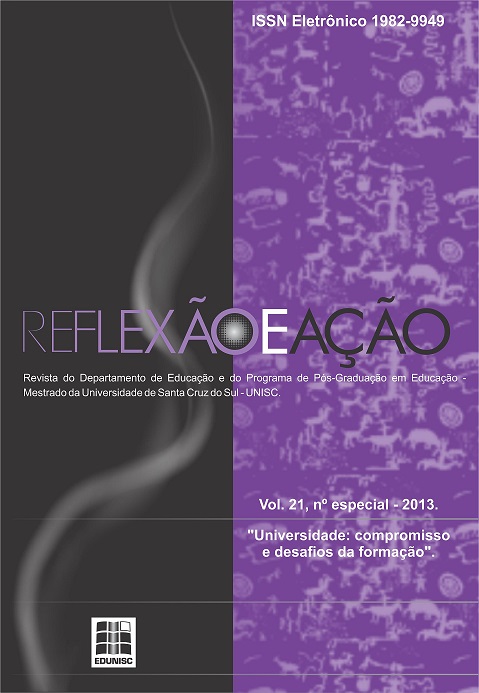CONVERSATIONS IN THE TEACHING INTERNSHIP: THE EMERGENCE OF THE POTENTIAL OF VIRTUAL LEARNING OBJECTS BY PEDAGOGICAL MEDIATION IN PHYSICS TEACHING
DOI:
https://doi.org/10.17058/rea.v21i2.3152Keywords:
Physics Teaching, Teaching Internship, Recursiveness, Virtual Learning ObjectsAbstract
In this article we attempt to explain a study experienced in Teaching Internship, of the Graduate Course in Physics, discipline of Physics Education Activities II, Federal University of Rio Grande-FURG. The activities developed aimed to experience teaching as an interactive and reflective process, and also investigate the potential of virtual learning objects (OV) for educational activities in physics teaching. The concepts of recursion, recursiveness and structural coupling, present in Biology of Knowledge, subsidized the construction of the argument that there is a need of living, discussion and problematization in a recursive and recurring way of methodological issues related to the use of digital technologies in the context of Physics graduate courses. The analysis of this experience was based on the methodology of Discursive Textual Analysis, Moraes (2003), consisting of three phases: unitarization, categorization and meta-text. The results indicated by analysis are presented in two categories: Conversations about opportunities to teach Physics and Conversations on students’ production: the emergence of the potential of OV by pedagogical mediation, both guided by listening to the other and by recursive talk.Downloads
Downloads
Published
How to Cite
Issue
Section
License
The submission of originals to this journal implies on the transference, by the author(s), of the printed and digital publishing rights. The author´s rights to the published articles are the author´s, the journal has the rights over the first publication. The author(s) can only use the same results in other publications, indicating clearly that this journal was the original publisher. Since we are an open access journal, the free use of articles is permitted for educational and scientific applications, as long as they inform the source according with the CC-BY license from Creative Commons.


